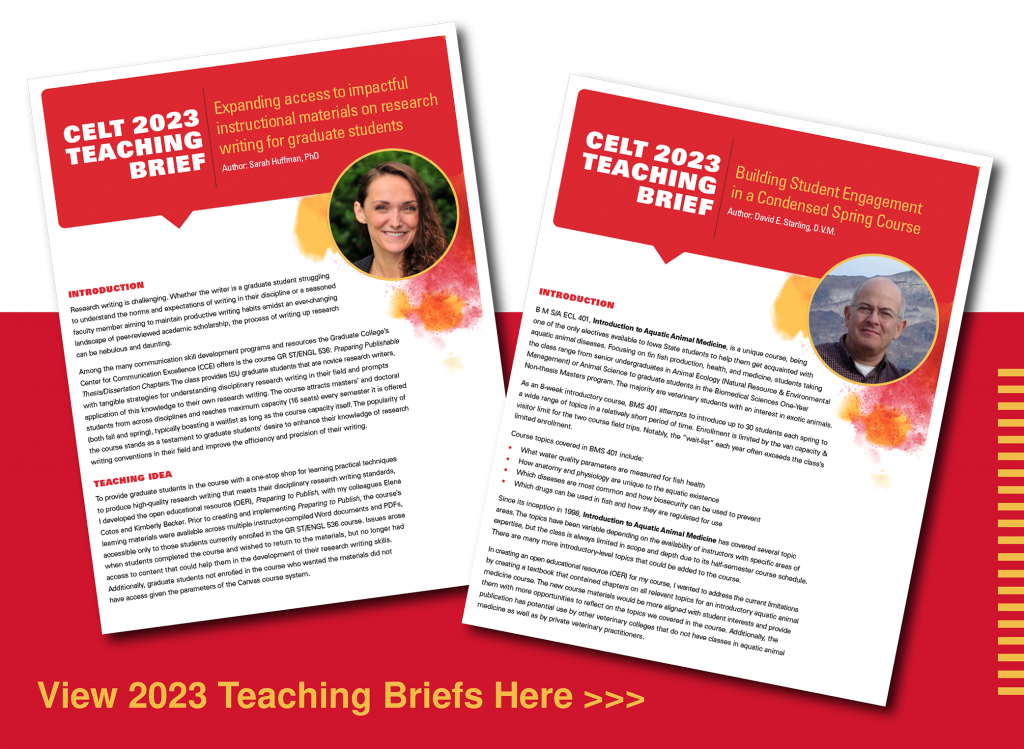CELT Teaching Briefs
In keeping with the CELT’s mission of “partnering with educators to advance student-centered learning at Iowa State University (ISU),” the collection focuses on practical advice, solutions, and implementations, exploring the topic of student-learning from a broad array of academic disciplines and perspectives.
2023 CELT Teaching Briefs
The Center for Excellence in Learning and Teaching (CELT) and University Library accepted proposals for teaching briefs to showcase the implementation of open educational practices into teaching and learning through the use and/or creation of open educational resources (OER) at Iowa State University. OER are free and openly licensed instructional materials that can be adapted for various teaching and learning contexts. Such materials are widely used around the world, providing equal access to free, high-quality educational materials.
This year, the teaching briefs highlight the 5-year anniversary of ISU’s Miller Open Education Mini-Grant Program, which supports instructors who incorporate OER into their courses by providing funding for OER’s adoption, editing, or creation. Over the past 5 years, many instructors have received mini-grants to enhance their courses, and even more have adopted OER without funding. The briefs will celebrate the work of these instructors and their impact on students by sharing their innovative teaching practices, from open pedagogy to open textbooks and other educational resources.
2023 CELT Teaching Briefs
Expanding Access to Impactful Instructional Materials on Research Writing for Graduate Students
Sarah Huffman, PhD, Program Specialist
Graduate College, Iowa State University of Science and Technology
Building Student Engagement in a Condensed Spring Course
David E. Starling, D.V.M, Associate Teaching Professor
College of Veterinary Medicine, Iowa State University of Science and Technology
2022 CELT Teaching Briefs
As educators, we recognize that teaching strategies that promote a sense of belonging are critical to student well-being, learning, and academic success. Therefore, we chose the common theme of the 2022 CELT Teaching Briefs: “Fostering Student Sense of Belonging in the Classroom: Creative Practices from Iowa State University Instructors,”
The contributors shared instructional strategies to create a sense of belonging and support student motivation, engagement, and success. These strategies may be used effectively at all times, but the ongoing pandemic made it abundantly clear that to navigate a rigorous curriculum, students must feel supported, motivated, and included in their online, in-person, and multi-modality classrooms and the Annual Inclusive Classroom Training (AY21-22).
2022 CELT Teaching Briefs
Creating Connection Through Communities of Practice in a Graduate Dietetics Program
Erin Bergquist MPH, RD, LD, Clinical Professor
Department of Food Science and Human Nutrition Iowa State University of Science and Technology
Using Literature to Teach about Equity, Diversity, and Social Justice in Graduate-Level Courses
Erin Doran, Ed.D, Associate Professor
School of Education, Iowa State University of Science and Technology
Developing an Online Public in an Asynchronous Public Speaking Course
Katie Fulton, Assistant Professor
Department of English, Iowa State University of Science and Technology
Introducing a New Tool to Level the Playing Field
Brian Hornbuckle, Professor
Department of Agronomy, Iowa State University of Science and Technology
From Won’t Read to Will Read: An Assignment to Foster Student Engagement
Julie Irish, Ph.D., Assistant Professor
College of Design, Iowa State University of Science and Technology
A Case-Based Learning Approach to Foster Dialogue Around Difficult Issues
Gabriel Rodriguez, Ph.D., Assistant Professor
School of Education, Iowa State University of Science and Technology
Alyssa Emery, Ph.D., Assistant Professor
School of Education, Iowa State University of Science and Technology
2021 CELT Teaching Briefs
“Teaching through the Pandemic, effective practices from Iowa State University’s instructors, and online and hybrid course modalities” was our first teaching brief focus. The collection focuses on practical advice, solutions, and implementations, exploring the topic from a broad array of academic disciplines and perspectives.
FALCON 2024 Request for Proposals
Pedagogy ABCs: Teaching Excellence in the Twenty-First Century September 27, 2024, Virtual New instructors often are misguided in how to teach college students, relying on methods from their time as

Transitioning a flipped language course from blended to online delivery, Dr. Shenglan Zhang
Shenglan Zhang, Associate Professor of Chinese, subscribes to the idea that practice is central to the acquisition of second languages. Synchronous, instructor-facilitated, and spaced-out practice paired with constructive feedback can enhance student speaking skills in times of social distancing!

Serving up success: Devising a “class menu” for online teaching, Cason Murphy
As a faculty member in a discipline that creates an art form where self-isolation is difficult, if not impossible, Cason Murphy, Assistant Professor of Theatre, describes how embracing technology led to new and creative ways for his students to use their agency for practice and improvement of their performance skills.

Effective assessments in an asynchronous, online, large-enrollment chemistry course, Dr. Cristina Bonaccorsi and Ritushree Chatterjee
Cristina Bonaccorsi, Associate Teaching Professor of Chemistry, and Ritushree Chatterjee, Senior Instructional Designer, ELO, detail different assessment strategies to evaluate learning progress and communicate frequent and constructive feedback, affording students numerous opportunities to self-correct and reflect.

The Human-Centered Design Approach for Online Teaching, Dr. Evrim Baran and Dana Alzoubi
Evrim Baran, Associate Professor of Educational Technology and Teacher Education, and graduate student Dana Alzoubi use a human-centered design approach for building a community of inquiry and empathy in their courses where students engage in complex problem-solving.
